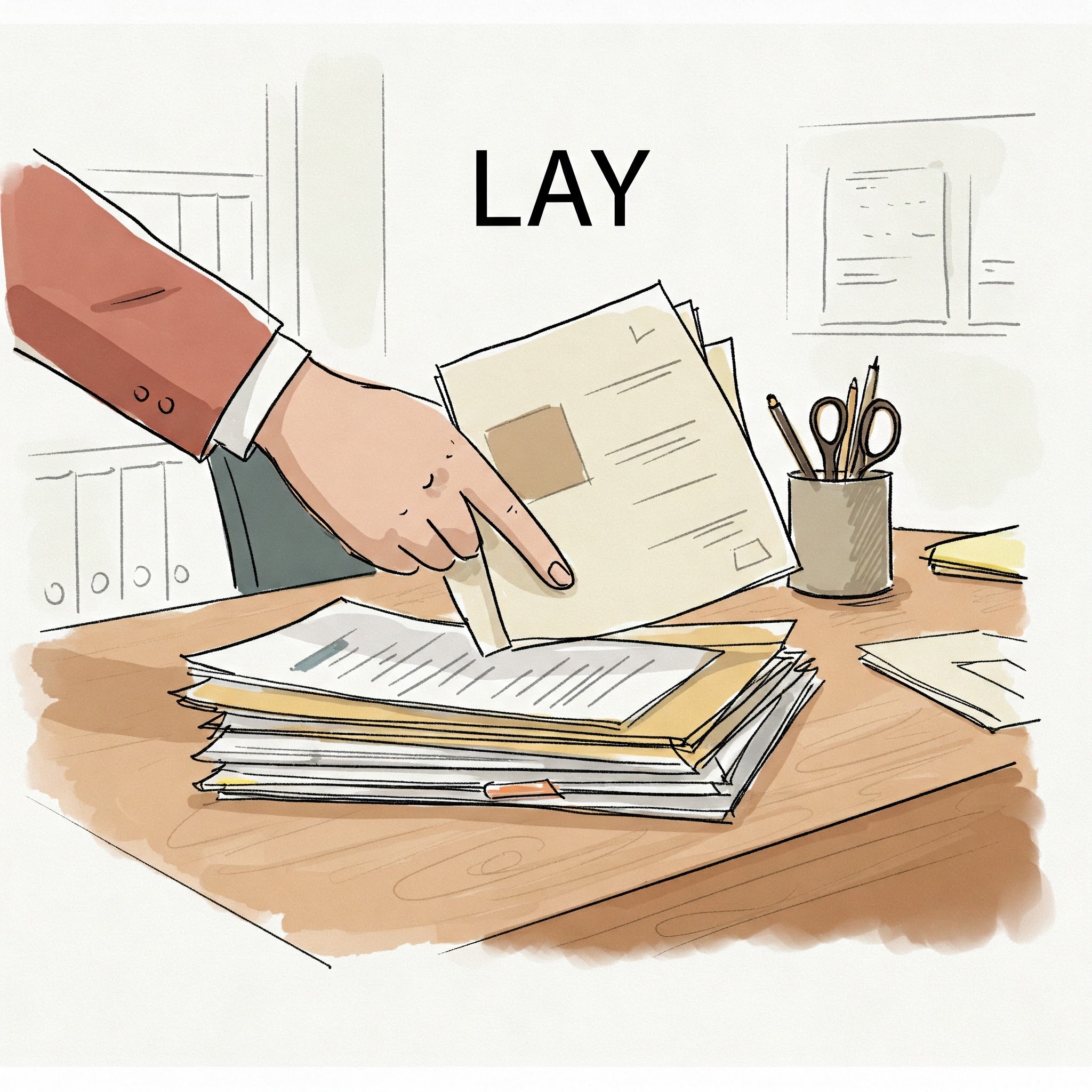Lay
Definition
Lay is a verb and, less commonly, a noun. As a verb, it means to put or place something down in a specific position, often carefully or deliberately. As a noun, it refers to the general appearance or position of something, or a short narrative poem in a traditional style.
Parts of Speech
- Verb
- Noun
Pronunciation
American English
- IPA Pronunciation: /leɪ/
- Respelling: LAY
British English
- IPA Pronunciation: /leɪ/
- Respelling: LAY
Etymology
The word "lay" comes from Old English "lecgan," meaning "to place or put down," which is related to Old Norse "leggja" and German "legen." Its roots trace back to Proto-Germanic "*lagjaną" and Proto-Indo-European "*legh-," meaning "to lie or lay down."
Derivatives
- Laid (verb, past tense)
- Layperson (noun)
- Layer (noun)
- Layman (noun)
- Layabout (noun)
Synonyms
- Place
- Set
- Position
Antonyms
- Lift
- Pick up
- Raise
Usage
The verb "lay" is widely used in contexts that involve placing objects, as in "She laid the book on the table." It is often confused with "lie," which means to recline. The noun form appears in less common contexts, such as in poetry or descriptive writing.
Related Terms
- Lie: To recline or be in a horizontal position (distinct from "lay").
- Layer: A single level in a stack or covering.
- Position: A specific arrangement or placement.
Detailed Definitions
Verb
- To put or place something down: Refers to the act of setting something in a specific position.
- Example: "Please lay the papers on my desk."
- To produce eggs (used for birds and reptiles): Refers to the act of an animal depositing eggs.
- Example: "The hen laid three eggs this morning."
- To arrange or prepare something systematically: Refers to setting up or organizing.
- Example: "They laid the groundwork for the new project."
Noun
- The general appearance or position of something: Refers to the arrangement or structure of an object.
- Example: "The lay of the land was ideal for farming."
- A short narrative poem in a traditional style: Refers to a form of lyrical or narrative poetry.
- Example: "The bard recited an ancient lay."
lay



🇨🇳 Mandarin (Simplified Chinese)
- 放 (fàng) - (to put, lay)
- IPA: /faŋ˨˩˦/
- Respelling: fahng
- 下蛋 (xià dàn) - (to lay an egg)
- IPA: /ɕi̯a˨˩˦ dan˧˥/
- Respelling: shyah dan
🇮🇳 Hindi
- रखना (rakhnā) - (to put, lay)
- IPA: /rəkʰnɑː/
- Respelling: rukh-naa
- अंडा देना (andā denā) - (to lay an egg)
- IPA: /əɳɖaː d̪eːnaː/
- Respelling: un-da de-na
🇪🇸 Spanish
- Poner (poner) - (to put, lay)
- IPA: /ˈponeɾ/
- Respelling: po-ner
- Poner un huevo (poner un huevo) - (to lay an egg)
- IPA: /ˈponeɾ un ˈweβo/
- Respelling: po-ner un we-vo
🇫🇷 French
- Poser (poser) - (to put, lay)
- IPA: /poze/
- Respelling: po-zeh
- Pondre (pondre) - (to lay an egg)
- IPA: /pɔ̃dʁ/
- Respelling: pohn-dr
🇦🇪 Modern Standard Arabic
- وضع (waḍʿ) - (to put, lay)
- IPA: /waɖʕ/
- Respelling: wad'
- يبيض (yabyiḍ) - (to lay an egg)
- IPA: /ja.bajidˤ/
- Respelling: ya-bai-d
🇧🇩 Bengali
- রাখা (rākhā) - (to put, lay)
- IPA: /ɹakha/
- Respelling: ra-kha
- ডিম দেওয়া (ḍim dē'ōẏā) - (to lay an egg)
- IPA: /ɖim d̪e.o.ja/
- Respelling: dim de-o-ya
🇷🇺 Russian
- Положить (polozhit') - (to put, lay)
- IPA: /pəlɐˈʐɨtʲ/
- Respelling: po-lo-zhit
- Отложить яйцо (otlozhit' yaytso) - (to lay an egg)
- IPA: /ɐtlɐˈʐɨtʲ ˈjæjtsə/
- Respelling: ot-lo-zhit yay-tso
🇵🇹 Portuguese
- Colocar (colocar) - (to put, lay)
- IPA: /ko.loˈkaɾ/
- Respelling: ko-lo-ka-r
- Botar um ovo (botar um ovo) - (to lay an egg)
- IPA: /boˈtaɾ ũˈo.vu/
- Respelling: bo-tar un o-vu
🇮🇩 Indonesian
- Meletakkan (meletakkan) - (to put, lay)
- IPA: /mələˈtakan/
- Respelling: me-le-tak-an
- Bertelur (bertelur) - (to lay an egg)
- IPA: /bərtəˈlur/
- Respelling: ber-te-lur
🇩🇪 German
- Legen (legen) - (to put, lay)
- IPA: /ˈleːɡn̩/
- Respelling: lay-gen
- Ein Ei legen (ein Ei legen) - (to lay an egg)
- IPA: /aɪn aɪ ˈleːɡn̩/
- Respelling: ain ai lay-gen
🇯🇵 Japanese
- 置く (oku) - (to put, lay)
- IPA: /oꜜkɯ/
- Respelling: o-ku
- 卵を産む (tamago o umu) - (to lay an egg)
- IPA: /tamaɡo o ɯmɯ/
- Respelling: ta-ma-go o u-mu
🇻🇳 Vietnamese
- Đặt (đặt) - (to put, lay)
- IPA: /ɗək˦ˀ˥/
- Respelling: dat
- Đẻ trứng (đẻ trứng) - (to lay an egg)
- IPA: /ɗe˧ˀ˥ tʐwɨŋ˧˥/
- Respelling: de trung
🇰🇷 Korean
- 놓다 (nohda) - (to put, lay)
- IPA: /no(ː)da/
- Respelling: no-da
- 알을 낳다 (al-eul nahda) - (to lay an egg)
- IPA: /al‿ɯl naːda/
- Respelling: al-eul na-da
🇹🇷 Turkish
- Koymak (koymak) - (to put, lay)
- IPA: /kojmak/
- Respelling: koy-mak
- Yumurtlamak (yumurtlamak) - (to lay an egg)
- IPA: /jumurtlamak/
- Respelling: yu-murt-la-mak
🇵🇰 Urdu
- رکھنا (rakhnā) - (to put, lay)
- IPA: /rəkʰnɑː/
- Respelling: rukh-naa
- انڈا دینا (andā dēnā) - (to lay an egg)
- IPA: /əɳɖaː d̪eːnaː/
- Respelling: un-da de-na





